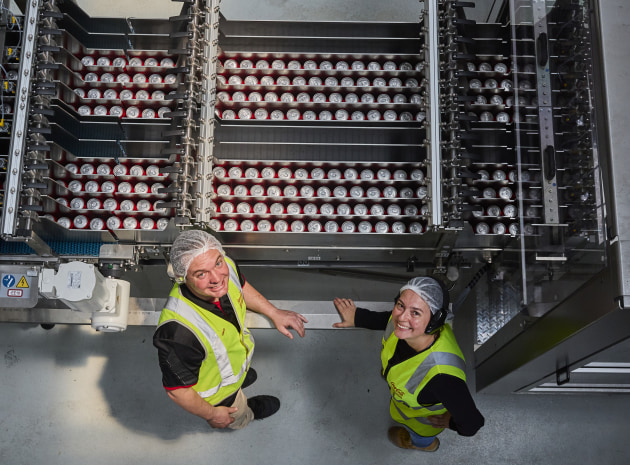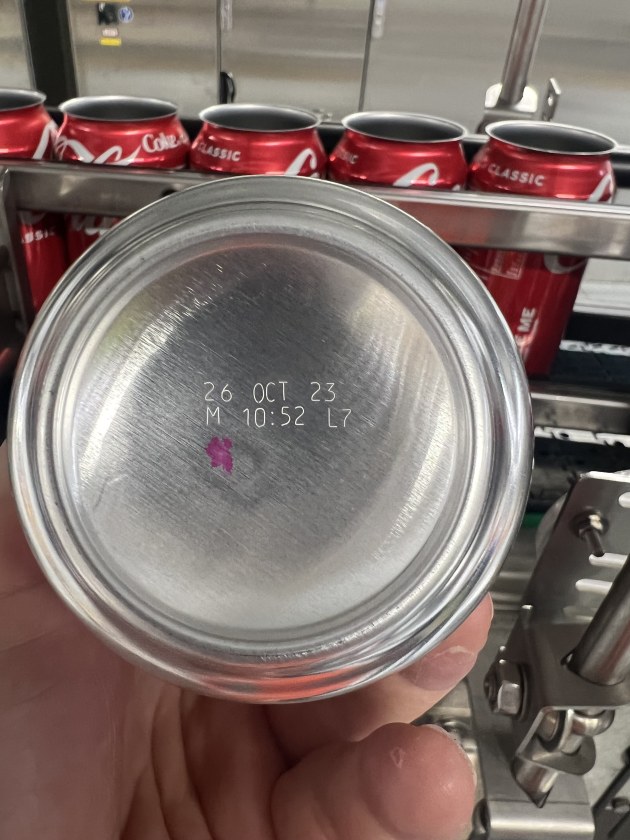
CCEP project lead David Holden (on the left) said a key supplier, Matthews Australasia was integrally involved in the project, playing a significant role in delivering the level of technology and systems capability to meet the high-speed and flexibility requirements. Image credit: PKN magazine
Matthews iDSnet technology is a key component in the most advanced canning line in Coca-Cola Europacific Partners’ (CCEP) Australasian network.
CCEP project lead David Holden said a key supplier, Matthews Australasia was integrally involved in the project, playing a significant role in delivering the level of technology and systems capability to meet the high-speed and flexibility requirements.
Matthews Regional Sales Manager, Matt Nichol, said the coding the labelling specialist’s completely integrated solution used iDSnet to integrate to CCEP’s ERP (SAP) system using work orders to start a run and integrate all coding, labelling and barcode-scanning technology across all formats of the production line – primary, secondary and palletising.
Housed at CCEP’s production site in Moorabbin (Victoria), the new line will allow the beverage manufacturer to significantly scale its local can production, and increase packaging-configuration flexibility to customers across Victoria, Tasmania and South Australia.
Matt Nichol said, “iDSnet simplifies the start-of-run process, catering to the multiple packaging formats CCEP is running on the high-speed production line.”
For primary coding, Matthews supplied a 100w Fiber laser (the SolarJet FL10) capable of printing at speeds of 2000 cans per minute. For secondary coding, Matthews installed several Linx 8900 series inkjet coders printing traceability codes onto the shipping packs. Matthews also integrated barcode scanners inside these packaging machines to ensure the correct packaging material is loaded, eliminating any potential packaging errors.

For primary coding, Matthews supplied a 100w Fiber laser (the SolarJet FL10) capable of printing at speeds of 2000 cans per minute . Image credit: PKN magazine
A range of CCEP pack formations require TUN labels to be applied for scanning through the supply chain.
“Matthews has installed TUN labellers capable of applying labels at 160 cases per minute. Our solution consisted of four labellers providing CCEP with a zero-downtime solution allowing them to continue running while changing labels. Their line never stops.”
Matt Nichol said that at the palletiser, Matthews has two print-and-apply SSCC pallet labellers that apply GS1-compliant labels to each pallet. This system ensures that the pallet, once complete, can be dispatched into the supply chain where it can be automatically scanned through Coles and Woolworths DCs uninterrupted.
“Matthews iDSnet software passes all the completed pallet data back to CCEP where they can update their inventory with finished goods.”
Mark Dingley, CEO of Matthews, describes the level of technology, flexibility and systems capability across the line as “next level”. Dingley said: “I’m proud that Matthews and our very own iDSnet had a role to play in achieving such a successful outcome for CCEP.”
CCEP’s David Holden said he is excited to see this cutting-edge line up and running, and that delivering it took “tremendous teamwork and collaboration” with partners to overcome the COVID-19 constraints.
The project, which was two years in the making, was delivered in partnership with key technology suppliers including Matthews Australasia, KHS and GPI .
This is an abridged version of an article that was published in PKN magazine online on 8 December 2022. You can read the full article here